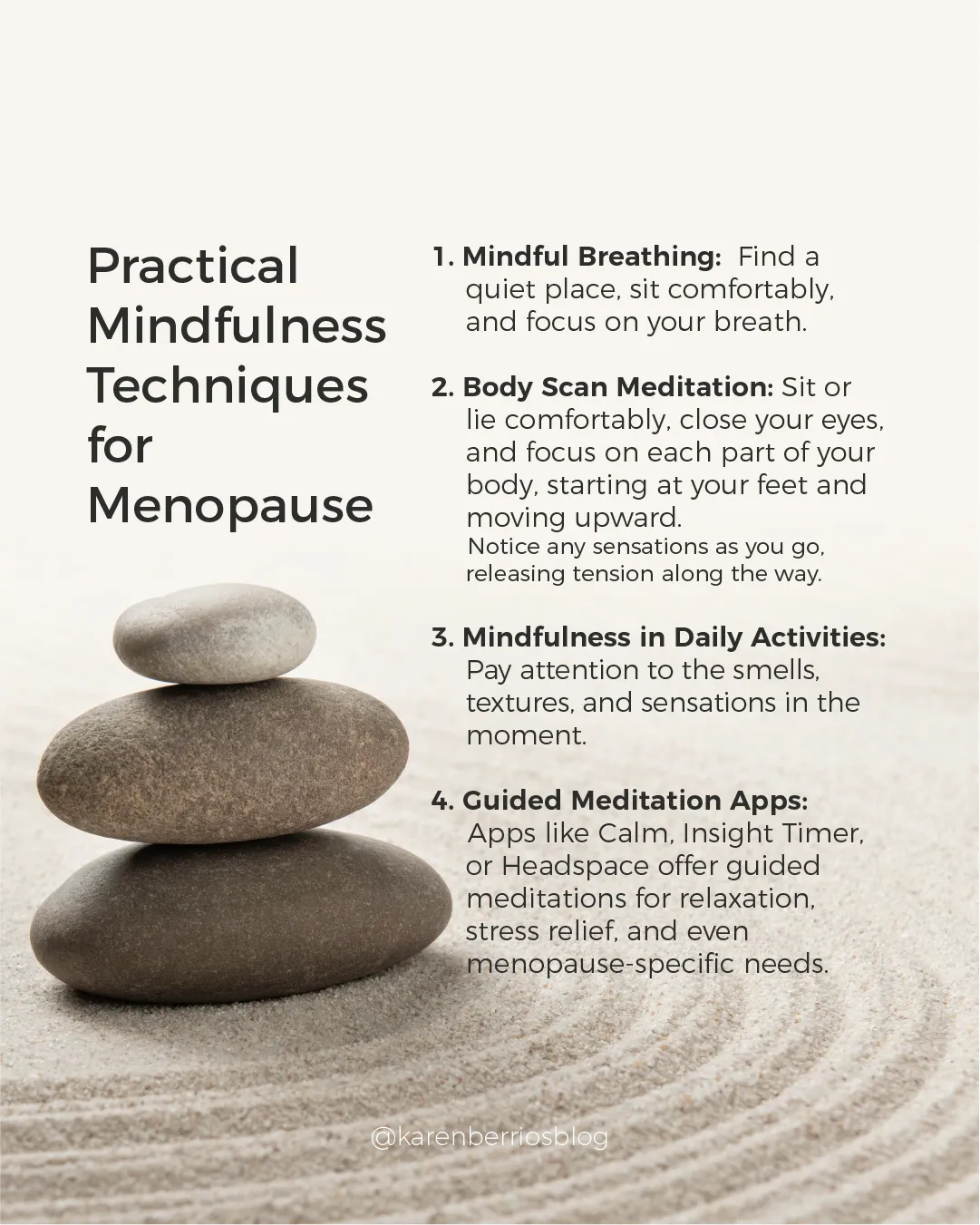

How does mindfulness help menopause?
Menopause is a natural phase in a woman’s life, yet it often brings challenges like hot flashes, mood swings, and increased stress. Mindfulness—the practice of being present and fully engaged in the moment—has emerged as a valuable tool in managing these symptoms.
Research supports the benefits of mindfulness for menopausal women. A study published in Menopause found that mindfulness training significantly reduced the degree of bother from hot flashes and night sweats.
Additionally, the Mayo Clinic reports that mindfulness is associated with fewer menopausal symptoms, particularly in women experiencing anxiety, depression, and irritability.
These findings highlight the potential of mindfulness to alleviate both physical and emotional challenges during menopause. By incorporating mindfulness practices into daily routines, women can navigate this transition with greater ease and well-being.
Understanding Menopause and Its Challenges
Menopause is a natural phase in every woman’s life, marking the end of menstrual cycles. Typically occurring between the ages of 45 and 55, this transition brings about significant hormonal changes, particularly a decline in estrogen and progesterone levels. These hormonal shifts can lead to a variety of symptoms, including hot flashes, night sweats, sleep disturbances, mood swings, and cognitive changes like memory lapses and difficulty concentrating.
The World Health Organization notes that the hormonal changes associated with menopause can affect physical, emotional, mental, and social well-being, with symptoms varying substantially from person to person.
Some women may experience few symptoms, while others face severe challenges or side effects that impact daily activities and quality of life.
Emotionally, the menopausal transition can increase the incidence of depression and anxiety. Harvard Health Publishing highlights that shifts in female hormone levels during this time can cause temporary mood changes, including symptoms of depression.
Women with a history of depression or anxiety might also see a resurgence in symptoms during this period.
Understanding these multifaceted challenges is crucial for navigating menopause with grace and resilience. By acknowledging the physical and emotional changes that accompany this transition, women can seek appropriate support, treatment options and interventions to enhance their quality of life during this significant phase.
What is Mindfulness and How Does it Help?
Mindfulness is the practice of being fully present in the moment, aware of your thoughts and feelings without judgment. For women navigating menopause, it can be a powerful tool to manage physical and emotional changes with more ease and grace.
- Hot Flashes: Mindfulness can help reduce the intensity of hot flashes by teaching you to focus on your breath and stay calm, creating a sense of control during these moments.
- Mood Swings: Hormonal shifts can cause unpredictable emotions. Mindfulness allows you to acknowledge your feelings without judgment, promoting self-compassion and balance.
- Stress and Anxiety: Menopause can feel overwhelming, but simple mindfulness practices like deep breathing help lower stress hormones and create calm amidst the chaos.
By embracing mindfulness, you gain tools to navigate menopause with greater resilience and care for yourself in a deeply empowering way.
Practical Mindfulness Techniques for Menopause
Menopause is a transformative time, and while it comes with its challenges, it also offers an opportunity to reconnect with your body and mind in new ways. Mindfulness is one of the most powerful tools we can use to navigate this season of life. Let’s explore a few simple techniques to help ease symptoms and bring a sense of calm and balance.
1. Mindful Breathing
When you feel a hot flash coming on, taking a few mindful breaths can make a world of difference. Find a quiet place, sit comfortably, and focus on your breath. Inhale slowly for four counts, hold for four, and exhale for four. Repeat this for a few minutes.
The North American Menopause Society (NAMS) highlights that “paced breathing, a component of mindfulness, can help reduce the intensity of hot flashes and improve overall emotional well-being.”
2. Body Scan Meditation
A body scan is a gentle way to check in with your body and release tension. Here’s how you can do it:
- Lie down or sit comfortably. Close your eyes.
- Start by focusing on your feet. Notice any sensations, tension, or comfort.
- Gradually move your attention upward—legs, hips, back, shoulders—until you’ve scanned your entire body.
Research from Harvard Health notes that “mind-body practices like body scan meditation can reduce stress and promote relaxation, making them ideal for managing menopause symptoms.”
3. Mindfulness in Daily Activities
You don’t have to carve out extra time to practice mindfulness—it can be part of your daily routine! Try being fully present during simple tasks like drinking your morning tea, folding laundry, or taking a walk. Pay attention to the smells, textures, and sensations in the moment.
The Mayo Clinic recommends this approach, saying, “By focusing on the present moment, mindfulness can help alleviate anxiety and promote a sense of grounding during periods of hormonal fluctuation.”
4. Guided Meditation Apps and Resources
If you’re new to mindfulness, using a guided meditation app can help you get started. Apps like Calm, Insight Timer, or Headspace offer meditations tailored to relaxation, stress relief, and even menopause-specific needs.
According to the American Psychological Association (APA), “guided meditation can be an effective way to establish a mindfulness habit and reduce the psychological burden of menopausal symptoms.”
Mindfulness doesn’t have to be complicated or time-consuming. Even a few minutes a day can create noticeable shifts in how you experience menopause. The key is to start where you are and give yourself grace along the way. You deserve to feel supported and empowered during this journey!
Tips for Getting Started with Mindfulness
Mindfulness doesn’t have to be overwhelming—start small and make it work for you. Here are a few simple tips to ease into the practice:
- Start Small: Dedicate 5-10 minutes daily to mindful breathing or a short meditation. Consistency matters more than perfection.
- Create a Routine: Pick a time, like morning or evening, to make mindfulness a regular part of your day.
- Be Patient: It takes time to feel natural. Give yourself grace and celebrate small progress.
- Find Your Fit: Try meditation, journaling, or yoga to see what feels right for you.
- Seek Support: Use mindfulness apps, books, or join a group for guidance and encouragement.
Final Thoughts
Mindfulness is such a beautiful gift you can give yourself during this transformative stage of life. It’s not about being perfect or getting it “right”—it’s about showing up for yourself in small, intentional ways. These moments of presence can make a big difference in how you navigate the ups and downs of menopause.
As you explore mindfulness, remember to be kind to yourself. It’s a journey, not a destination, and every step you take brings you closer to balance, peace, and well-being. You have the strength within you to embrace this season with grace and courage, and mindfulness can be a gentle companion along the way.

hey there
I'm Karen!
I have found my cancer journey to be a positive and profound transformational experience. I’m inspired to share my healing journey here, and trust you’ll find hope, encouragement and purpose as you discover the healing power that lies within you.
Join
The Mailing List!
By signing up for my newsletter, you agree with our Privacy Policy and Terms & Conditions.



